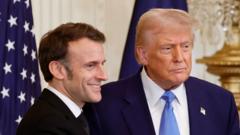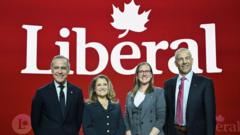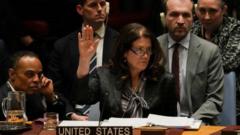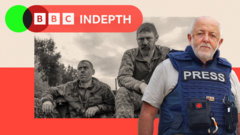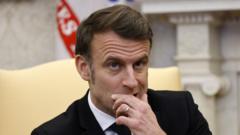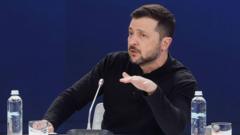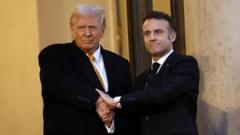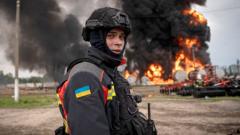As the conflict in Ukraine reaches a pivotal anniversary, divergent perspectives emerge between the U.S. and Europe, reflecting deeper geopolitical rifts.
Tensions Rise Between the U.S. and Europe on Ukraine Conflict

Tensions Rise Between the U.S. and Europe on Ukraine Conflict
Leaders Diverge in Views on War’s Causes and Resolutions at Critical Anniversary
In a marked occasion coinciding with the third anniversary of Russia's invasion of Ukraine, U.S. President Trump and French President Emmanuel Macron met at the White House for discussions that exposed significant disagreements over the conflict. Trump characterized the war's conclusion as potentially achievable "within weeks," while hinting at a possible trip to Moscow in the near future. Trump refrained from labeling Russian President Vladimir Putin a dictator, contrasting sharply with Macron’s unequivocal statement identifying Russia as the aggressor.
This meeting reflects broader tensions between the U.S. and Europe. At the United Nations, the U.S. countered a European-led initiative to condemn Russia's actions and demanded its withdrawal from Ukraine, instead proposing a resolution that called for simply ending the conflict - a move seen by critics as aligning more closely with Russian interests than with its European allies.
On the ground in Ukraine, President Zelensky is navigating a precarious situation as he attempts to manage international relationships, notably with Trump's administration, which some analysts argue may not be serving Ukraine's interests as effectively as hoped. Meanwhile, the Ukrainian military is facing its own challenges, struggling to replenish its forces as wounded soldiers return to battle against Russian aggression.
In the wake of these developments, President Putin has publicly invited U.S. businesses to invest in Russia and explore opportunities in Russian-occupied Ukraine, portraying a narrative that suggests better relations could be economically beneficial. This strategic framing complicates the dialogue surrounding the conflict, underscoring the diverse perspectives held by the involved parties and the complexities of international diplomacy as they all grapple with the harrowing humanitarian toll of the ongoing war.

